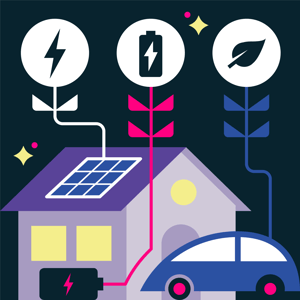Home energy batteries: what are they and who needs them?
If you have solar panels then you can be proud that you’re generating your own renewable energy and reducing your reliance on the national grid.
But as any green homeowner knows, solar panels don’t generate energy at night-time. So, you must buy energy from your electricity supplier to fill that gap. Meanwhile, any surplus energy that you generate during the day is exported back to the grid.
But thankfully there’s a simple solution to make better use of the energy you generate yourself: a battery, or energy-storage system, which stores the electricity captured during the day, for use at another time.
The result can be lower fuel bills and reduced carbon emissions, as you’re not as reliant on electricity from the grid.
New tech
Home energy storage technology is relatively new. There is a limited, but growing, range of products from suppliers including Nissan, Tesla and Powervault, which range in size, capacity and price.
According to researchers at BRE Group, a typical system when fully charged, could store enough energy to power your lights and lower-powered items like your fridge-freezer, TV and laptop during the evening. However, the battery will quickly run out if you use heavy energy users such as a washing-machine or tumble-dryer.
Most batteries enable you to track your energy use online and decide when to charge your storage unit and when you need to draw on that power.
But battery capacity varies, typically ranging from 1kW to 7kW. The size of the units therefore varies greatly, from the size of a computer up to washing machine-type proportions.

Making it work financially
Installing a home-energy storage system is a long-term investment. According to Energy Saving Trust, the initial cost of batteries ranges from £4,000 to £6,000, including VAT. But this is expected to fall in the future as demand grows and the tech improves.
The financial benefits depend on your individual circumstances. According to consumer group Which? whether a battery will save you money will depend on:
- the cost of installation
- the type of system installed (DC or AC, chemistry of the battery, connections)
- how it’s used (including the effectiveness of the control algorithm)
- the price of electricity (and how it changes during the lifetime of your system)
- the battery’s lifetime
So, if you’re considering home energy storage but are unsure, see if you can get the answers to these questions from battery providers. You could go a step further, as Energy Saving Trust suggests, and ask the installer to calculate savings for you based on your home and circumstances.
Batteries are not yet for everyone. If you have a small solar PV system that generates little excess energy to store, you probably won’t save much money by getting a home battery. Also, if you’re considering buying an energy storage system as a back-up during power cuts, beware that some battery storage systems aren’t designed to work during power-cuts. So do your homework.
The right tariff
Some new home energy tariffs work particularly well with a system combining solar power and home storage.
Time-of-use electricity tariffs offer cheaper energy during specified off-peak, low demand times of day. People on these tariffs can save money by charging their battery when electricity is cheaper and avoid using expensive peak-time energy from the grid.

Electric vehicles
To really make the most of your solar generation and battery, then you would combine them with an electric vehicle (EV). This will increasingly become the norm ahead of the UK Government planned ban on sales of petrol and diesel cars by 2040. Everyone is going to be driving electric.
As the numbers of EVs increase, their huge demand for electricity is going to be a big challenge for energy generation in the UK. To help meet this challenge, ‘Vehicle to Grid’ systems are being trialled which automatically charge your car when demand on the grid is low, and then sell the energy back to the grid when demand is high. So, you save money, and help to reduce pressure on the grid.
But the interplay between electric cars and home storage goes further than that. Reconditioned cells from electric vehicles can and are being used as home batteries.
This is a fast-moving market, with a constant stream of new innovations. One thing is for sure though; the way we use energy is changing forever, and energy storage is a big part of that.
• • •
With Loop, you can find out how you use electricity, then make smart decisions about using less - click here to find out more. We have a risk-free, no-quibble, money-back guarantee as standard, so what's to lose...apart from some £££ from your bills and some weight from your carbon footprint?







